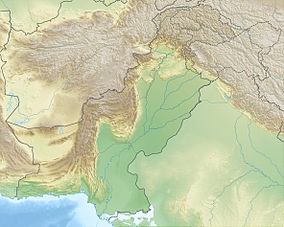Chinji National Park
| Chinji National Park | |
|---|---|
| Location | Talagang, Salt Range, Punjab, Pakistan |
| Nearest city | Jhalta |
| Coordinates | 33°0′36.87″N 72°29′30.98″E / 33.0102417°N 72.4919389°E |
| Area | 60.95 km2 (23.53 sq mi) |
| Elevation | 2,231 ft (680 m) |
| Established | 1987 |
| Visitors | 2000 - 5000 |
| Governing body | Wildlife and Parks Department, Government of Punjab (Pakistan) |
Chinji National Park (shortened as Chinji), established in 1987,[1] is a protected area of IUCN category II (national park) located on Sargodha road Near Chinji Town in District Talagang Punjab, Pakistan.[2] It covers a total area of 6,095 hectares (15,061 acres).[3] Chinji National Park is located close to Salt Range, about 130 km from Islamabad in the south.
Landscape
[edit]The area has an elevation imperial of 2,231 feet (680 m). Deeply eroded land of Chinji consists of sandstone to igneous rocks, combined with small deposits of rock salt from the Salt Range. Deep torrential streams and ravines slope into the Soan River, which passes through the area.[citation needed]
Climate
[edit]Chinji National Park | |
|---|---|
 Chinji National Park In 2023 |
Average annual rainfall in the area is 537 mm, out of which 308 mm is in the monsoon season from July to September. Maximum temperature is 27 °C in June and minimum is 2.2 °C in January. Frost is common in winter season. Relative humidity can reach up to 80% in monsoon.[citation needed]
Wildlife
[edit]The Chinji National Park exhibits the biome of deserts and xeric shrublands and falls in the ecoregion of 'Baluchistan xeric woodlands' (PA1307).[4] The area is characterized to have sub-tropical vegetation with many plant species of importance. A few of the mammals found here include the Urial, Golden jackal, Bengal fox, Indian wolf and Indian pangolin. A few game birds include Grey francolin and Common wood pigeon[5]
Fauna and flora
[edit]List of fauna found in the national park.[6][7]
- Mammals
| # | Name | Scientific name | Picture |
|---|---|---|---|
| 1 | Brandt's hedgehog | Paraechinus hypomelas | 
|
| 2 | Asian house shrew | Suncus murinus | |
| 3 | Indian bush rat | Golunda ellioti | 
|
| 4 | Northern palm squirrel | Funambulus pennantii | 
|
| 5 | Yellow-throated marten | Martes flavigula | 
|
| 6 | Indian pangolin | Manis crassicaudata | 
|
| 7 | Bengal fox | Vulpes bengalensis | 
|
| 8 | Red fox | Vulpes vulpes | 
|
| 9 | Indian wolf | Canis lupus pallipes | 
|
| 10 | Small Indian civet | Small Indian civet | 
|
| 11 | Indian long-eared hedgehog | Hemiechinus collaris | 
|
| 12 | Indian crested porcupine | Hystrix indica | 
|
| 13 | Black rat | Rattus rattus | 
|
| 14 | House mouse | Mus musculus | 
|
| 15 | Indian grey mongoose | Urva edwardsii | 
|
| 16 | Small Indian mongoose | Urva auropunctata | 
|
| 17 | Indian jackal | Canis aureus indicus | 
|
| 18 | Jungle cat | Felis chaus | 
|
| 19 | Asiatic wildcat | Felis lybica ornata | 
|
| 20 | Punjab urial | Ovis vignei punjabiensis | 
|
- Reptiles
| # | Name | Scientific name | Picture |
|---|---|---|---|
| 1 | Bengal monitor | Varanus bengalensis | 
|
| 2 | Yellow-belly gecko | Hemidactylus flaviviridis | 
|
| 3 | Oriental garden lizard | Calotes versicolor | 
|
- Birds
| # | Name | Scientific name | Picture |
|---|---|---|---|
| 1 | Chukar partridge | Alectoris chukar | 
|
| 2 | See-see partridge | Ammoperdix griseogularis | 
|
| 3 | Grey francolin | Ortygornis pondicerianus | 
|
| 4 | Common quail | Coturnix coturnix | 
|
| 5 | Rock dove | Columba livia | 
|
| 6 | Black-winged stilt | Himantopus himantopus | 
|
| 7 | Laughing dove | Spilopelia senegalensis | 
|
| 8 | Red-wattled lapwing | Vanellus indicus | 
|
| 9 | Greater coucal | Centropus sinensis | 
|
| 10 | White-throated kingfisher | Halcyon smyrnensis | 
|
| 11 | Red-vented bulbul | Pycnonotus cafer | 
|
| 12 | Black-shouldered kite | Elanus axillaris | 
|
| 13 | Black kite | Milvus migrans | 
|
| 14 | Eurasian teal | Anas crecca | 
|
| 15 | Common pochard | Aythya ferina | 
|
See also
[edit]References
[edit]- ^ "Country Report on Plant Genetic Resources for Food and Agriculture - Pakistan" (PDF). parc.gov.pk. Pakistan Agricultural Research Council. Archived from the original (PDF) on 18 January 2012. Retrieved 22 September 2010.
- ^ "Chinji National Park ready to open this year". The Express Tribune. 3 January 2021.
- ^ "Chinji National Park". wdpa.org. World Database on protected Areas. Retrieved 22 September 2010.[permanent dead link]
- ^ "Baluchistan xeric woodlands". Terrestrial Ecoregions. World Wildlife Fund. Retrieved 22 September 2010.
- ^ "Ovis orientalis vignei". iucnredlist.org. The IUCN Red List of Threatened Species. 2010. Retrieved 22 September 2010.
- ^ Kanwal, Rimsha (9 February 2022). "Diversity and density of mammals in Chinji National Park, district Chakwal, Punjab, Pakistan". Zenodo. Zenodo. Retrieved 17 November 2023.
- ^ Imran, Myra (7 February 2021). "Chinji National Park: Unexplored beauty of Potohar landscape". The News. The News. Retrieved 17 November 2023.
External links
[edit]- World Database On Protected Areas (WDPA) - Profile[permanent dead link]
- Conservation of dry shrub forests in Salt Range - Planning report
- wildlifeofpakistan.com

